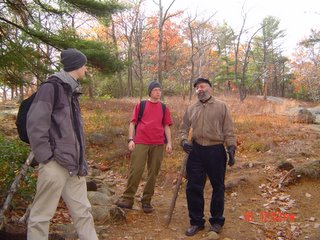
Today, on YCT's hike, I mainly ascended with other students, in addition to myself, though I was able to listen to the Rosh haYeshiva speaking with some students about the school's mission statement and about Israel, which was interesting. However, on my way down, I caught up with Rabbi Love, and listened to him as students were asking him questions and discussing different topics (Rabbi Love in action with stick in hand, while discussing something (probably the future of Jewry) with students Sorin Rosen and Yonah Berman). But as the question of women aliyos and כבוד צבור (honor of a congregation) came up, I
 started thinking of different understandings, etc. What struck me was how תוספות (Tosafot, commentary of medieval rabbis (if you have no idea who they are, click the link or go to Wikipedia)) might have played around with these and other varying concepts.
started thinking of different understandings, etc. What struck me was how תוספות (Tosafot, commentary of medieval rabbis (if you have no idea who they are, click the link or go to Wikipedia)) might have played around with these and other varying concepts.This year, at least certainly this year, in the first year of rabbinical school at YCT, we are focusing on Rishonim, starting mainly on Tosafos, especially as it is one of, if not the, hardest such commentaries to decipher. I've been getting kind of frustrated with how they just blend all these different ideas with no distinctions as to whether the statement is tannaitic, amoraic, or stammaitic. Granted, it is interesting to see how Tosafos deal with various issues in the Talmud in their quest for figuring out halakhah (despite my frustration from my previous statement).
What also struck me is no
 t just the playing around of halakhic concepts, but how sometimes, it doesn't matter for what the halakhah may allow, but that certain things don't go well in people's minds. This came up very visibly in people's comments to my Women and Simhat Torah posting, when people suggested that this-or-that may not be too comfortable for them. I found it interesting as I live most of my days in
t just the playing around of halakhic concepts, but how sometimes, it doesn't matter for what the halakhah may allow, but that certain things don't go well in people's minds. This came up very visibly in people's comments to my Women and Simhat Torah posting, when people suggested that this-or-that may not be too comfortable for them. I found it interesting as I live most of my days in
1 comment:
What people are comfortable with is mostly based on what they're used to rather than on objective standards. Since people won't do something for fear of making people uncomfortable, and no one will be comfortable with s/t if it's not done, then it becomes circular.
Post a Comment